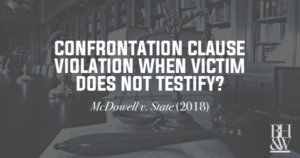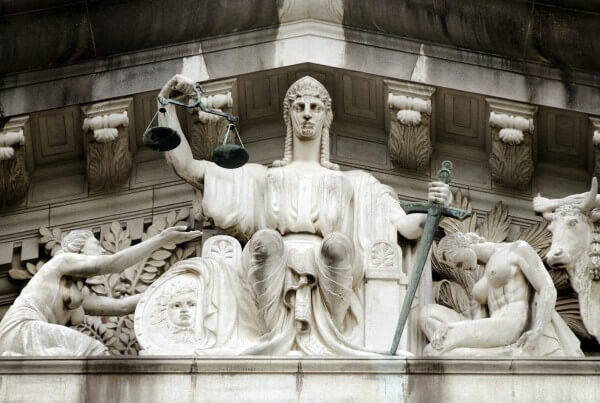Tarrant County Trial Court Admits Testimony in Violation of the Confrontation Clause
 The Second Court of Appeals recently released a memorandum opinion, which reversed a defendant’s conviction due to a confrontation clause violation. The issue was whether the trial court (Criminal District Court Number 1, Tarrant County) erred in allowing an officer to testify about certain statements the alleged victim made regarding a prior assault allegation.
The Second Court of Appeals recently released a memorandum opinion, which reversed a defendant’s conviction due to a confrontation clause violation. The issue was whether the trial court (Criminal District Court Number 1, Tarrant County) erred in allowing an officer to testify about certain statements the alleged victim made regarding a prior assault allegation.
McDowell v. State—2nd Court of Appeals (2018)
The Facts—Defendant Was Convicted for Felony Domestic Violence
On August 21, 2016, officers were alerted to a domestic disturbance in progress. When officers arrived at the scene they made contact with the victim and the victim’s friend who had reported the disturbance. While talking with the two females, officers noticed multiple bruises on the victim and learned that the suspect (i.e. Defendant), who had allegedly assaulted the victim, was still inside the home. Officers subsequently entered the residence and arrested Defendant.
At trial, dash-cam video showing the accusations made by the two females was admitted. In addition, one of the officers testified to additional statements made by the victim suggesting that the defendant had a history of violence. These additional statements, however, were not included in the dash cam video. Defendant objected to these statements under Crawford because the victim did not appear at trial. Nonetheless, the trial court allowed the out-of-court statements to be admitted over objection.
In addition to the officer’s testimony regarding the hearsay statements, the jury heard from two other witnesses about the cycle of domestic violence. The State then referenced this testimony in relation to Defendant’s history of domestic violence during closing arguments. As a result, Defendant was convicted. Defendant later appealed his conviction arguing that the trial court erred when it allowed the officer to testify to the victim’s statements in violation of the confrontation clause of the 6th Amendment.
Court of Appeals Reverses and Remands Case—Holding the Trial Court Erred in Admitting the Officer’s Testimony
Generally, the Confrontation Clause bars admission of testimonial statements of a witness who does not appear at trial. In determining whether certain statements were testimonial in nature, “the Court looks to see whether circumstances were present at the time the statements were made that would indicate the existence of an ongoing emergency.” If such circumstances existed, the statements are admissible.
Here, the victim did not appear at trial. As such, the Court of Appeals attempted to analyze whether the victim’s statements were testimonial in nature by determining whether they were made during the ongoing emergency. However, the Court was unable to do so because there was no evidence from the State regarding when these statements were made. The Court concluded that without knowing the timing at which the statements were made, there was no way to determine the existence of an ongoing emergency. The Court explained that once there is an objection to the admission of evidence on confrontation grounds the burden shifts to the State. Here, the State was silent in regard to the confrontation objection. And, without the State providing more evidence, the Court could not conclude that the statements were nontestimonial. Accordingly, the Court held that the trial court erred in admitting the statements.
The Court then conducted a harm analysis to determine whether the error impacted the jury’s verdict, which would require a reversal. In making its determination, the Court noted that the majority of the officer’s testimony was based on the inadmissible statements. These statements portrayed a history of violence rather than just one instance. Further, the other witnesses’ testimony hinged on these inadmissible statements. Thus, because the inadmissible statements were a crucial part in establishing the elements of the offense, the Court could not say beyond a reasonable doubt that the trial court’s error did not contribute to Defendant’s conviction and, therefore, a reversal was required.









